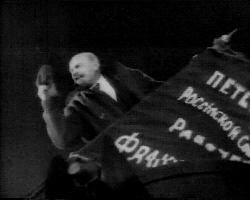
October The film itself is stunningly mounted and photographed, using non-professional actors (some of whom had been involved in the actual events): and in particular the editing is a dazzling display of technique which has rarely been matched. This is one of the most important films in the history of the cinema: a pity, then, that it seems to have been badly served on DVD. The version available in the USA is drawn from a SoveExportFilm version released around 1970, with a score by Shostakovich: it's not clear whether the Eureka Video version released in the UK is from the same print. The score has its good points: but the restoration has been insensitively done. Although an attempt has been made to reinstate scenes deleted from the existing master negative, some important shots are missing; and worse, some shots have been stretch-printed (slowed down) and some haven't, which has a disastrous effect on the rhythm of the editing. I recently watched my off-air video copy of a version assembled by Tyne-Tees Telvision (of all people) and broadcast by Channel Four in 1992. This is an excellent print - it looks as if it may be from the British Film Institute print which was made from the original camera negative in the 1960s - which runs more than ten minutes longer than the DVD (probably because it is being shown at the correct speed rather than having any extra material). It also has the original score by Edmund Meisel (he also scored Battleship Potemkin) which adds to the historical value. Meisel builds excitement by much use of repeated phrases reminiscent of the minimalist techniques of Philip Glass some forty years later, though Meisel is fond of raising the pitch of the phrase by a semitone each time round: the repetition gets wearing after a bit but the whole style does go well with the film. It's a pity that this version - if it even still exists - is unlikely ever to be issued on DVD as the inferior SovExportFilm version has established itself but doesn't do this marvellous film justice. Posted: Tue - July 10, 2007 at 08:34 AM by Roger Wilmut |
Quick Links
About Me:
Roger Wilmut XML/RSS Feed
MY PODCAST
Archives
Calendar
Blogroll
WEBRINGS
Statistics
Total entries in this category: Published On: Mar 11, 2016 05:00 PM |
||||||||||||||||||


